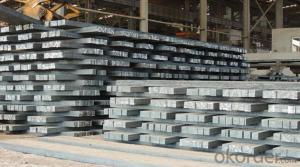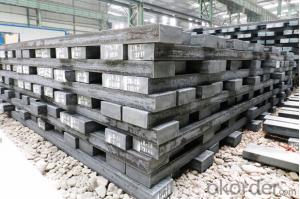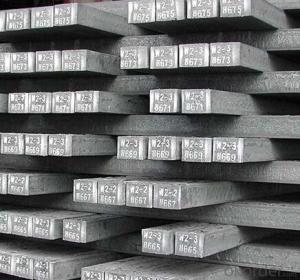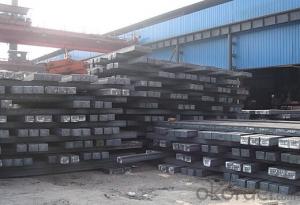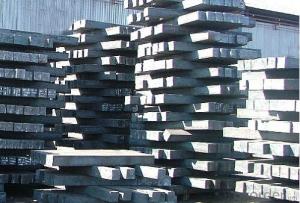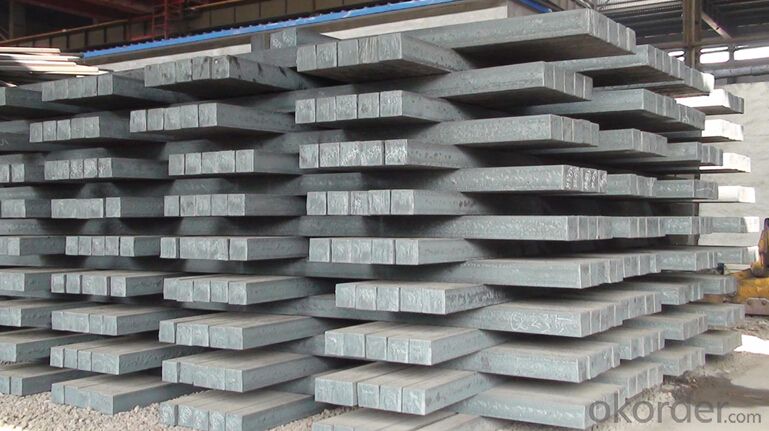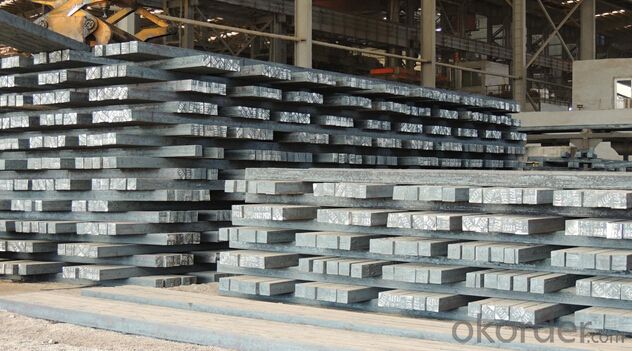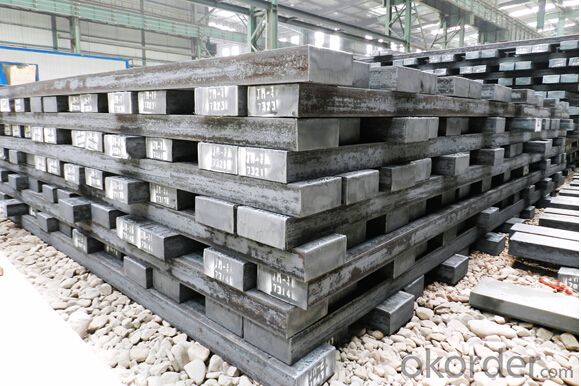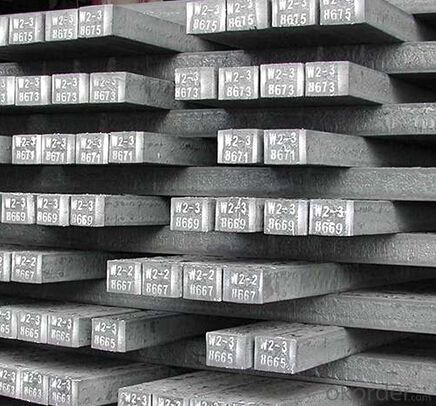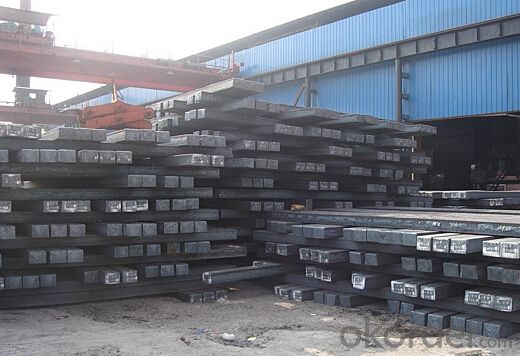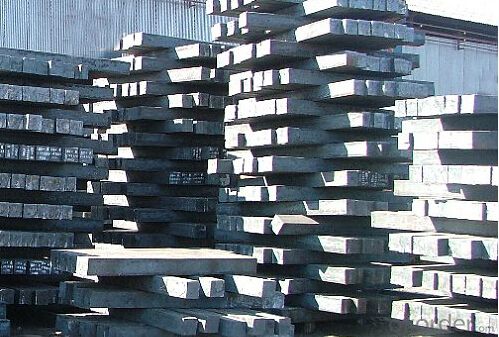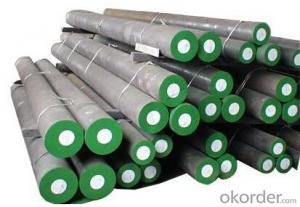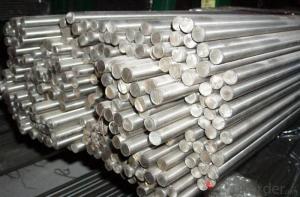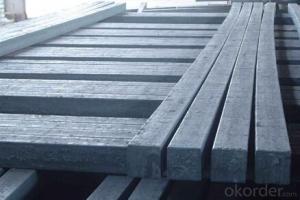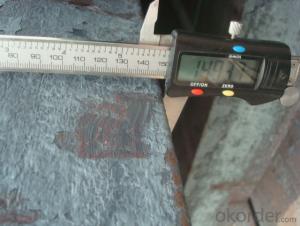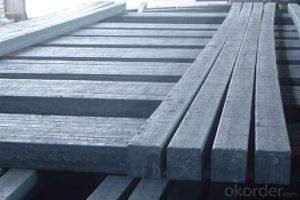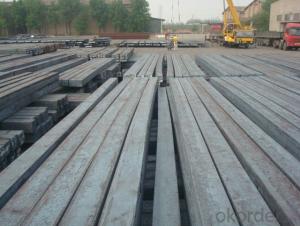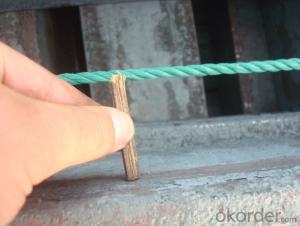Prime Quality Q195/215 CNBM Steel Billets with Competitive Price
- Loading Port:
- Shanghai
- Payment Terms:
- TT OR LC
- Min Order Qty:
- 5000 m.t.
- Supply Capability:
- 10000 m.t./month
OKorder Service Pledge
OKorder Financial Service
You Might Also Like
Specification
Product Description
| GRADE | SIZE | APPLICATION |
Q195/ 215 | 100mm*100mm*6m | REBAR |
| 120mm*120mm*6m | ||
| 130mm*130mm*6m/12m | ||
| 150mm*150mm*6m/12m |
Chemical Compositon
Q195/ 215 | C (%) | Si (%) | Mn (%) | P(%) | S(%) |
| 0.06-0.12 | 0.15-0.30 | 0.35-0.50 | 0.045% Max | 0.045Max |
Company Information:
CNBM International Corporation is the most important trading platform of CNBM group.
Whith its advantages, CNBM International are mainly concentrate on Cement, Glass, Iron and Steel, Ceramics industries and devotes herself for supplying high qulity series of refractories as well as technical consultancies and logistics solutions.
Packing & Delivery
1. Packaging: seaworthy package or as required
2. Delivery: 35-45 days or based on quantity
Products Show
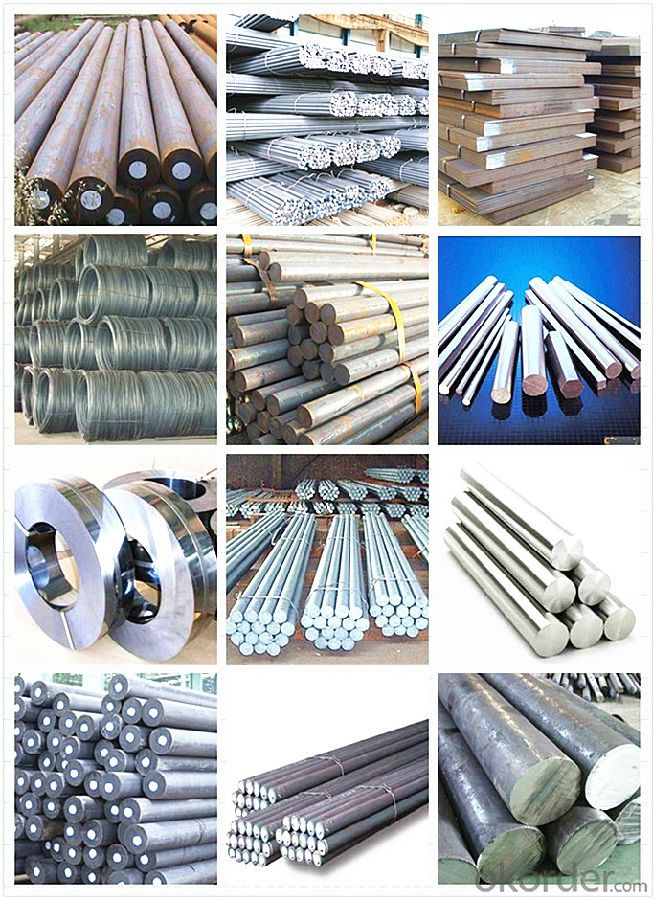
Workshop
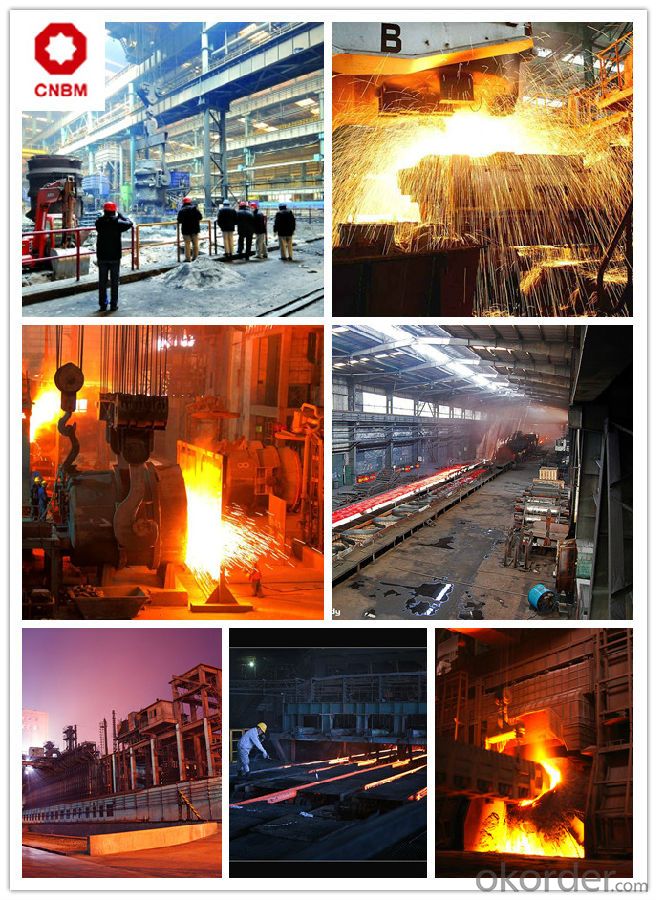
FAQ:
1.Your advantages?
Professional products inquiry, products knowledge train (for agents), smooth goods delivery, excellent
customer solution proposale
2. Test & Certificate?
SGS test is available, customer inspection before shipping is welcome, third party inspection is no problem
3. Factory or Trading Company?
CNBM is a trading company but we have so many protocol factories and CNBM works as a trading department
of these factories. Also CNBM is the holding company of many factories.
4. Payment Terms?
30% TT as deposit and 70% before delivery.
Irrevocable L/C at sight.
5. Trading Terms?
EXW, FOB, CIF, FFR, CNF
6. After-sale Service?
CNBM provides the services and support you need for every step of our cooperation. We're the business
partner you can trust.
For any problem, please kindly contact us at any your convenient time.
We'll reply you in our first priority within 24 hours.
- Q: How does special steel contribute to the telecommunications aftermarket industry?
- Special steel plays a crucial role in the telecommunications aftermarket industry by providing the necessary materials for the manufacturing and maintenance of various telecommunications equipment. This type of steel is specifically designed to possess exceptional properties, such as high strength, corrosion resistance, and durability, which are essential for the demanding conditions of the telecommunications sector. One of the main contributions of special steel to the telecommunications aftermarket industry is its use in the production of communication towers and transmission structures. These structures need to withstand extreme weather conditions, including strong winds and heavy loads, while also providing reliable support for antennas and other equipment. Special steel is capable of meeting these requirements, ensuring the longevity and stability of communication towers. Furthermore, special steel is extensively used in the manufacturing of cables and wires used in telecommunications systems. These cables need to transmit signals without any loss or interference, and the unique properties of special steel, such as high electrical conductivity and low resistance, make it an ideal material for this purpose. The use of special steel in cables helps maintain the quality and efficiency of telecommunications networks. Another significant contribution of special steel is in the production of equipment enclosures and cabinets. These enclosures provide protection to sensitive electronic components from environmental factors, such as moisture, dust, and extreme temperatures. Special steel, with its corrosion-resistant properties, ensures the longevity and reliability of these enclosures, safeguarding the valuable equipment inside. Moreover, special steel is also utilized in the manufacturing of various components and accessories used in the telecommunications aftermarket industry. These include connectors, brackets, and hardware, which are essential for assembling and maintaining telecommunications equipment. Special steel's high strength and durability make it a preferred choice for these components, ensuring their long-lasting performance. In conclusion, special steel contributes significantly to the telecommunications aftermarket industry by providing the necessary materials for the manufacturing and maintenance of various telecommunications equipment. Its exceptional properties, including high strength, corrosion resistance, and durability, make it an ideal choice for communication towers, cables, enclosures, and various components. By utilizing special steel, the telecommunications industry can ensure the reliability, efficiency, and longevity of its equipment, ultimately benefiting both service providers and end-users.
- Q: How does special steel contribute to the pharmaceutical industry?
- Special steel plays a crucial role in the pharmaceutical industry by offering exceptional strength, corrosion resistance, and durability. It is used in the manufacturing of various equipment and components such as storage tanks, reactors, piping systems, and precision instruments. The unique properties of special steel ensure the integrity and purity of pharmaceutical products, prevent contamination, and enable efficient and safe production processes.
- Q: What are the different forms in which special steel is available?
- Special steel is available in various forms such as bars, plates, sheets, tubes, wires, and forgings.
- Q: What are the challenges in forming special steel?
- Several challenges arise when forming special steel due to its unique characteristics and properties. Some of the primary difficulties include: 1. The high melting point of special steels necessitates the use of specialized equipment and processes for heating and shaping the material. This can result in increased energy consumption and costs. 2. Special steels typically contain various alloyed elements to enhance their properties, such as strength, hardness, and corrosion resistance. However, controlling the alloy composition precisely can be challenging, as even minor variations can have a significant impact on the material's properties. 3. Certain special steels, such as tool steels, have a high carbon content to improve hardness and wear resistance. Unfortunately, this high carbon content makes the material more susceptible to cracking during forming processes like forging or rolling. Great care must be taken to prevent cracks and achieve the desired shape. 4. Special steels often require specific heat treatment processes, like quenching and tempering, to achieve the desired mechanical properties. These processes can be complex and require precise control of temperature, time, and cooling rates. Improper heat treatment can result in poor material performance or even structural failure. 5. Achieving the necessary surface finish and dimensional accuracy is crucial in applications where special steels are used, such as the aerospace or automotive industry. This can be challenging during forming operations, necessitating advanced tooling and precision machining techniques. 6. Forming special steels may require specialized equipment and expertise, such as high-pressure hydraulic presses, induction heating equipment, or vacuum furnaces. These specialized tools and processes add complexity and costs to the manufacturing process. Despite these challenges, forming special steels is vital in various industries that require their unique properties. Manufacturers continually invest in research and development to overcome these challenges and enhance the forming processes of special steels.
- Q: Can special steel be used for making chemical processing equipment?
- Yes, special steel can be used for making chemical processing equipment. Special steel, such as stainless steel or corrosion-resistant alloys, are commonly used in the construction of chemical processing equipment due to their excellent resistance to corrosion, high temperature and pressure, and ability to withstand harsh chemical environments.
- Q: What are the properties of mold steel?
- Mold steel is known for its excellent hardness, wear resistance, and ability to withstand high temperatures. It possesses good machinability and can be easily polished or textured to create intricate mold designs. Mold steel also exhibits high toughness and dimensional stability, ensuring long-lasting and precise molds. Additionally, it is resistant to corrosion and offers good heat conductivity, making it suitable for various molding applications in industries such as automotive, aerospace, and consumer goods.
- Q: What is the difference between stainless steel and special steel?
- Stainless steel is a type of steel that contains a high amount of chromium, which makes it resistant to corrosion and staining. On the other hand, special steel refers to a wide range of alloys that are specifically designed to have unique properties, such as high strength, heat resistance, or electrical conductivity. While stainless steel is primarily used for its corrosion resistance, special steel is tailored to meet specific requirements in various industries, such as aerospace, automotive, or construction.
- Q: What are the different surface hardening grades of special steel?
- There are several different surface hardening grades of special steel, each designed to provide specific characteristics and properties. Some of the commonly used grades include: 1. Case-hardening steels: These grades are typically low carbon steels that are designed to develop a hard outer layer, or case, while maintaining a softer core. This is achieved through processes like carburizing or nitriding, which introduce carbon or nitrogen into the surface of the steel. Case-hardening steels are often used in applications where wear resistance and toughness are required. 2. Tool steels: These grades are specifically designed for use in cutting, forming, and shaping tools. Tool steels are known for their high hardness, resistance to wear, and ability to retain their cutting edge even at elevated temperatures. Various types of tool steels are available, such as high-speed steel (HSS), hot work steel, cold work steel, and plastic mold steel, each suitable for specific applications. 3. Stainless steels: These grades of special steel contain a minimum of 10.5% chromium, which provides excellent corrosion resistance. Stainless steels can be hardened through processes like precipitation hardening or martensitic transformation. They are commonly used in industries such as food processing, chemical, and medical, where resistance to corrosion and high temperatures are crucial. 4. High-strength steels: These grades are designed to provide exceptional strength and toughness. They often contain alloying elements like manganese, chromium, or nickel to enhance their mechanical properties. High-strength steels are commonly used in structural applications, automotive components, and heavy machinery. 5. Maraging steels: These grades of special steel are known for their high strength, toughness, and excellent resistance to fracture. Maraging steels achieve their properties through a unique aging process, which involves a precipitation-hardening treatment. They find applications in aerospace, defense, and tooling industries. 6. Bearing steels: These grades are specifically formulated to provide excellent wear resistance and durability for use in bearing applications. Bearing steels often contain alloying elements like chromium, molybdenum, and vanadium to enhance their mechanical properties and resistance to fatigue. These are just a few examples of the different surface hardening grades of special steel. Each grade offers unique properties and characteristics, allowing for a wide range of applications in various industries.
- Q: What are the properties of boron steel?
- Boron steel, also known as boron-alloyed steel, possesses several unique properties. It is exceptionally strong and has a high tensile strength, making it ideal for applications that require high-strength materials. Boron steel also exhibits good hardenability, meaning it can be hardened by heat treatment processes such as quenching and tempering. Additionally, it has excellent wear resistance and is often used in the manufacturing of cutting tools and wear-resistant components. Moreover, boron steel offers good weldability and formability, allowing it to be easily shaped and joined. Overall, the properties of boron steel make it a valuable material in various industries, including automotive, construction, and tool manufacturing.
- Q: How does special steel perform in terms of thermal expansion?
- Special steel typically performs well in terms of thermal expansion. It has a low coefficient of thermal expansion, meaning it expands and contracts less with temperature changes compared to other types of steel. This makes it more dimensionally stable and less prone to warping or distortion when exposed to heat or cold.
Send your message to us
Prime Quality Q195/215 CNBM Steel Billets with Competitive Price
- Loading Port:
- Shanghai
- Payment Terms:
- TT OR LC
- Min Order Qty:
- 5000 m.t.
- Supply Capability:
- 10000 m.t./month
OKorder Service Pledge
OKorder Financial Service
Similar products
Hot products
Hot Searches
Related keywords

